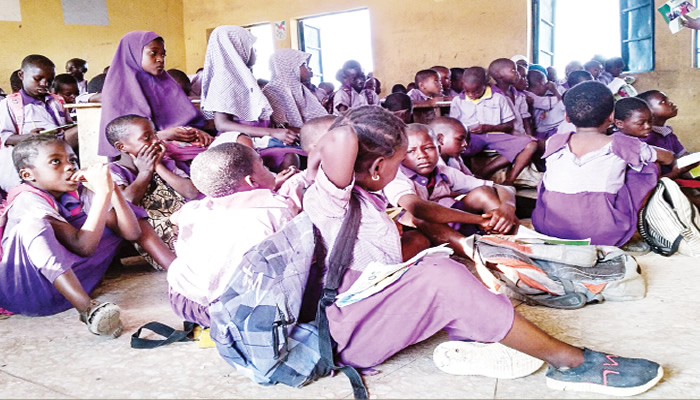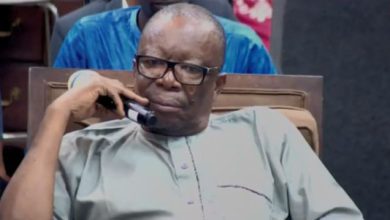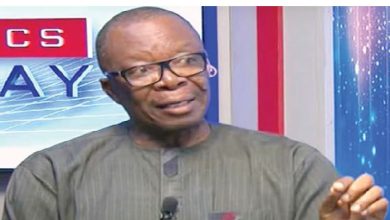
DEBORAH TOLU-KOLAWOLE writes on the poor learning conditions at the Local Education Authority School in Zone 9, Lugbe, Abuja, where primary school pupils close at 12pm to make room for secondary pupils to resume
For the pupils at the Local Education Authority School in Zone 9, Lugbe, Abuja, the future indeed holds little or no hope and promises of a better life. This is largely because the institution of learning has become the epitome of rot and neglect.
Despite being located in the largest area council in Abuja (Abuja Municipal Area Council), the school has little to show in terms of infrastructure for its contribution to human capital development.
The school, which is under the control of the Abuja Municipal Area Council, is designed to cater to pupils in the primary and post-primary school levels; however, puplis are left without desks to receive lessons, a lack of adequate teachers, and other basic amenities.
When our correspondent, who disguised as a worker of an international non-governmental organisation, visited the school, it was learnt that for many years, the area council had not provided the school with enough desks and chairs for pupils, just as staff were seen standing with no chairs to sit.
It was also observed that while the government did not provide the school with enough teachers, the management staff had to source for teachers who were being paid with contributions by the Parent-Teacher-Association.
It was observed that in some of the classes, there were no fewer than 80 pupils.
Speaking with our correspondent, a staffer who did not want to be named for fear of sanctions said, “The situation here is not palatable at all. I have been working here for close to three years. Pupils don’t have enough chairs, and the infrastructure is terrible. We operate a primary and secondary school here. When the pupils in the primary classes close by 12pm, the ones in secondary school, LEA Secondary School, resume in the afternoon, and that is how we rotate. The toilet is nothing to write home about. We don’t have enough teachers. Most of the time, we depend on the money received from the PTA to run the affairs of the school because we don’t get anything else. The new administrator who was recently posted here has been trying. She resumed here in January, but she has been trying her best.”
According to the Director of Programmes at Reform Education Nigeria, Ayodamola Oluwatoyin, “There’s more to a student’s academic success than just being taught; the environment in which they learn has a major impact on their progression.”
Moving around the classes, our correspondent observed that some of the floors of the classrooms were cracked, thus making it difficult for pupils to sit on them as chairs are almost nonexistent in the school. The few available ones are shared by pupils who, according to a teacher, come to school early.
“Some of them just come to school because they have a passion for learning. The situation here is not palatable. Even as a teacher, I am discouraged. Some of our colleagues here were not employed by the area council, but because we needed teachers, the school had to employ them and pay them from PTA funds. I can even take you to see the toilet situation; we’ve written letters to the early education department and gone to the area council all to no avail,” another teacher who spoke on the condition of anonymity told our correspondent.
Beyond the lack of tables and chairs for learning, our correspondent also observed that some of the classes had leaky roofs, which may pose challenges to learning during the rainy season.
While expressing disappointment in how much the school has decayed, another teacher urged the government to quickly come to the aid of the people and renovate the school, saying that it was the only hope for the people in the area.
“The government needs to help; this school is the only accessible school for children from this area. It’s disappointing that this is happening. Some of them don’t have the opportunity to go to better schools; this is all they have, and we need the help of NGOs and the government,” he said.
While a library is expected to house collections of books, periodicals, and sometimes recordings for people to read, borrow, or refer to, the one at LEA Zone 9 is a mere carcass, accommodating only a few outdated books.
Apart from not having a functional library, students at the school also do not have the luxury of a computer laboratory. The closest thing they have seen to a computer is inside a textbook. While having a conversation with our correspondent, some of the pupils joked about how they had been equipped with the textbook theory of how a computer works but had never operated one in reality.
“We don’t have computers in our school; our teachers teach us from textbooks, and we write the examination based on what we have been taught,” a primary school pupil simply identified as Ruqayah said.
During the visit, our correspondent was privileged to meet with a parent who simply identified himself as Mallam Muhammad.
Speaking to our correspondent, the parent who expressed sadness at the poor state of the school said, “I have five children, two in the primary section and three in the secondary section. The way they operate is like this. The primary pupils close by 12pm while the secondary pupils resume in the afternoon. I did not have a choice, and that is the reason why I brought my children here. When you move around, you will see how things are arranged. The classrooms and even the toilets are bad. They don’t have drinking water, and some children have to sit on the floor. The government needs to attend to this. The children are our future; it doesn’t make any sense for our children not to have good access to education. While we were growing up, things were not like this. We need well-wishers to please intervene.”
Expert calls on govt
Speaking with our correspondent, the Director of Programme, Reform Education, Ayodamola Oluwatoyin, urged the government to awaken to its responsibility.
“Basic education is not something to be joked with. It is a very important stage in anyone’s life. It is unfair that the government at all levels has totally abandoned education. I’m sure that when you move around the states, you will witness the same issues. I am sure you will even see schools where there are no classrooms. While CSOs and philanthropists have important roles to play, the government bears the majority of the responsibility,” Oluwatoyin said.
All efforts to get the chairman of AMAC through his media aide, Kingsley Madak proved abortive as he had yet to respond to inquiries by our correspondent as of the time of filing this report.



